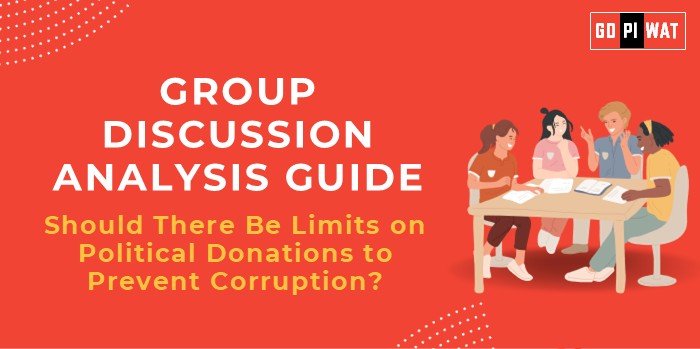📋 Group Discussion (GD) Analysis Guide
🌟 Should There Be Limits on Political Donations to Prevent Corruption?
🌐 Introduction to the Topic
Opening Context: Political donations are a cornerstone of modern democracies, enabling parties to fund campaigns and connect with citizens. However, unchecked donations can lead to undue influence, fostering corruption and undermining the democratic process.
Topic Background: The debate over limits on political donations stems from concerns about transparency and fairness. Countries like the US, UK, and India have grappled with this issue, balancing free speech and equitable political representation. In India, the introduction of electoral bonds in 2018 brought reforms, but concerns about opacity remain.
📊 Quick Facts and Key Statistics
- 🌍 Global Spend on Elections: $100 billion annually – highlighting the scale of political financing.
- 💰 Electoral Bonds in India: ₹10,000+ crore redeemed since 2018 – emphasizing opacity concerns.
- 🏛️ Top 10 Donors in US Politics (2022): Accounted for 40% of donations – signaling donor concentration risks.
- 🔍 Indian Political Donations Disclosure (FY 2022): 69% of funds’ sources remain undisclosed – raising transparency issues.
👥 Stakeholders and Their Roles
- Governments: Enact policies to regulate donations, such as transparency mandates.
- Political Parties: Receive and utilize funds for campaigns; often resist stringent regulations.
- Corporates and High-Net-Worth Individuals: Major contributors; influence policies.
- Civil Society and Media: Advocate for transparency and highlight misuse of funds.
- Election Commissions: Implement and monitor donation regulations to ensure fairness.
🏆 Achievements and Challenges
✨ Achievements:
- 💡 Enhanced Campaigning Capabilities: Funds empower parties to reach wider audiences.
- 📜 Regulatory Efforts: Nations like Canada and Germany enforce strict limits, ensuring accountability.
- 📣 Increased Voter Engagement: Donations fund outreach, encouraging voter turnout.
⚠️ Challenges:
- 🚨 Corruption Risks: Unchecked donations foster quid pro quo deals.
- ❓ Opaque Systems: Electoral bonds and indirect funding methods reduce transparency.
- 🌍 Global Comparisons: Sweden’s stringent laws show effective donor influence control.
📚 Case Studies
- US: Citizens United v. FEC (2010) deregulated spending, increasing corporate influence.
- India: Electoral bonds raised concerns about transparency despite improving funding methods.
📋 Structured Arguments for Discussion
- Supporting Stance: “Limiting political donations will reduce corruption and ensure a level playing field, as seen in countries with stringent donation caps.”
- Opposing Stance: “Imposing limits may hinder political competition and restrict smaller parties from raising necessary funds.”
- Balanced Perspective: “While limits can prevent corruption, complementary measures like robust disclosure norms and voter education are essential.”
💡 Effective Discussion Approaches
- Opening Approaches:
- 📊 Statistics Opening: “69% of political funds in India are undisclosed, raising serious transparency concerns.”
- 📜 Case Study Opening: “The Citizens United ruling in the US demonstrates how unregulated donations impact policymaking.”
- Counter-Argument Handling: Use examples like Sweden’s transparency laws to counter claims of limited funds hindering campaigns.
🔍 Strategic Analysis of Strengths and Weaknesses
SWOT Analysis:
- Strengths: Enhances electoral transparency, reduces undue influence.
- Weaknesses: Potential funding gaps for smaller parties, implementation challenges.
- Opportunities: Adoption of digital transparency tools, global best practices.
- Threats: Resistance from vested interests, lack of enforcement.
📈 Connecting with B-School Applications
- Real-World Applications: Use in leadership and governance roles, focusing on policy-making and ethical standards.
- Sample Interview Questions:
- “How would you design a policy to regulate political donations?”
- “Can transparency in donations effectively reduce corruption?”
- Insights for B-School Students: Study political financing in global contexts and understand the intersection of finance, law, and governance.


